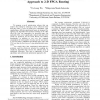Free Online Productivity Tools
i2Speak
i2Symbol
i2OCR
iTex2Img
iWeb2Print
iWeb2Shot
i2Type
iPdf2Split
iPdf2Merge
i2Bopomofo
i2Arabic
i2Style
i2Image
i2PDF
iLatex2Rtf
Sci2ools
104
click to vote
DAC
1995
ACM
1995
ACM
Orthogonal Greedy Coupling - A New Optimization Approach to 2-D FPGA Routing
We propose a novel optimization scheme that can improve the routing by reducing a newly observed router decaying effect. A pair of greedy-grow algorithms, each emphasizing a different optimization target are designed. By applying one algorithm first and then switching to the other when the first one approaches its decaying stage, the undesired effect can be significantly reduced and thus better results are produced. On the tested MCNC and industry benchmarks, in addition to our very low segment consumption the total number of tracks used by our scheme is 37% less than a published conventional maze router and 22% less than the best known 2-step global/detailed router [4,5]. Our results show that complicated multi-objective problems could be effectively attacked by coupling low complexity algorithms that traverse the solution space in orthogonal directions. This idea is applicable on both algorithmic and architectural optimization approaches [7].
2-step Global/detailed Router | Computer Architecture | Conventional Maze Router | DAC 1995 | Router Decaying Effect |
| Added | 26 Aug 2010 |
| Updated | 26 Aug 2010 |
| Type | Conference |
| Year | 1995 |
| Where | DAC |
| Authors | Yu-Liang Wu, Malgorzata Marek-Sadowska |
Comments (0)

